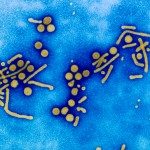Link to Pubmed [PMID] – 1360180
Virology 1992 Dec;191(2):670-9
The P68 protein kinase (referred to as P68 based on its M(r) of 68,000 in human cells) is a serine/threonine kinase induced by interferon treatment and activated by dsRNAs. The kinase is under tight controls in virus-infected cells since once activated, it phosphorylates its natural substrate eukaryotic initiation factor 2 (elF-2), leading to potential limitations in functional elF-2 and decreases in protein synthesis initiation. To further delineate the molecular mechanisms underlying kinase regulation, we attempted to express the P68 protein kinase in insect cells using a baculovirus vector. Repeated efforts to isolate recombinant baculoviruses containing a wild-type kinase failed, whereas recombinants expressing a nonfunctional kinase with a catalytic domain II mutation were readily isolated. When used to infect Spodoptera frugiperda cells, the recombinant virus expressed the exogenous mutant protein at almost 5-10% of the total proteins synthesized. We then purified the kinase by immunoaffinity chromatography to raise monospecific antiserum which recognized not only the human native wild-type P68, but also kinase homologues in murine, bovine, and monkey cells as determined by immunoblot and immunoprecipitation analysis. Fortunately, kinase function also could be assayed using this antibody since the human and nonhuman kinase homologues, present in immunoprecipitates, were autophosphorylated and phosphorylated the natural substrate, elF-2 alpha. Further, this antiserum recognized epitopes throughout the molecule including the amino and carboxyl termini in contrast to the available monoclonal antibody. In vitro assays using the polyclonal antibody revealed the importance of the amino terminus, especially amino acids 1-97, in the binding of the kinase to viral RNA activators and inhibitors. Finally, we determined that the P68 amino terminus was both necessary and sufficient for binding dsRNA as we were able to transfer dsRNA-binding properties to a reporter gene product previously unable to bind RNA.
